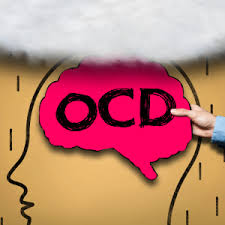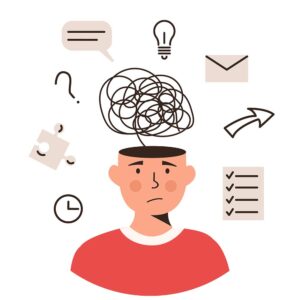Do you know someone who is always on the go, can’t seem to sit still and is constantly fidgeting? They might have ADHD. On the other hand, does someone you know seem to be a perfectionist to the point where it’s disruptive and causes them distress? They might have OCD. It can be hard to tell the difference between OCD and ADHD, but it’s important to understand both conditions. In this blog post, we will discuss the similarities and differences between OCD and ADHD, as well as how they are treated.
Contents
What Is OCD?
 OCD is an anxiety disorder that is characterized by uncontrollable, unwanted thoughts and repetitive behaviors. People with OCD may have difficulty keeping their hands clean or maybe excessively tidy. They may also be unable to throw things away or keep their belongings in order. OCD is also associated with a fear of contamination or germs.
OCD is an anxiety disorder that is characterized by uncontrollable, unwanted thoughts and repetitive behaviors. People with OCD may have difficulty keeping their hands clean or maybe excessively tidy. They may also be unable to throw things away or keep their belongings in order. OCD is also associated with a fear of contamination or germs.
This disorder is also characterized by obsessions, which are persistent and unwanted thoughts, impulses, or images that are intrusive and cause distress. People with OCD may try to suppress or ignore their obsessions, but this only leads to more anxiety. compulsions, on the other hand, are repetitive behaviors or mental acts that a person feels compelled to do to relieve the anxiety caused by the obsessions.
Sometimes people with OCD are also diagnosed with ADHD. It is important to know the difference between the two disorders so that you can get the proper treatment.
What Is ADHD?
 ADHD is a mental disorder that is characterized by problems with focus, hyperactivity, and impulsiveness. People with ADHD may have difficulty sitting still or paying attention. They may also be impulsive and act without thinking about the consequences of their actions. ADHD is a disorder that can be diagnosed in children, adolescents, and adults.
ADHD is a mental disorder that is characterized by problems with focus, hyperactivity, and impulsiveness. People with ADHD may have difficulty sitting still or paying attention. They may also be impulsive and act without thinking about the consequences of their actions. ADHD is a disorder that can be diagnosed in children, adolescents, and adults.
There is no single cause of ADHD, but it is thought to be caused by a combination of genetic and environmental factors. Treatment for ADHD typically involves medication, counseling, and behavioral therapy. People with ADHD may also benefit from educational and vocational interventions.
Relationship Between OCD and ADHD

The relationship between OCD and ADHD is not fully understood, but there are some similarities between the two conditions. Both OCD and ADHD can be diagnosed in childhood, and both involve problems with impulsivity, hyperactivity, and inattention. Some research suggests that children with OCD are more likely to also have ADHD, although it is not clear if one condition causes the other.
The relationship between OCD and ADHD is complex, and more research is needed to understand the link between the two conditions. However, if you or your child has been diagnosed with OCD or ADHD, it is important to seek treatment from a qualified mental health professional. Treatment can help reduce symptoms and improve functioning in both children and adults.
OCD and ADHD both can be very challenging that’s why it is important to understand as much as possible about each condition. And while there is still more to learn about the relationship between OCD and ADHD, treatment can make a big difference in managing symptoms and improving the quality of life for both children and adults.
If you or your child has been diagnosed with either OCD or ADHD, please seek professional help from a qualified mental health provider. Treatment can make a significant impact on reducing symptoms and improving functioning.
Negative Impacts of OCD And ADHD

OCD and ADHD can be extremely detrimental to one’s quality of life. Individuals with OCD often suffer from anxiety and depression, which can lead to social isolation and difficulty functioning in day-to-day life. ADHD can also cause problems in school and work, as well as relationship difficulties. In extreme cases, both disorders can lead to suicide.
Some of these impacts are:
Isolation
One such impact is social isolation. This can be due to the anxiety and depression that often comes with OCD, as well as the inattention and impulsivity characteristic of ADHD. This isolation can lead to further difficulties functioning in day-to-day life.
Problems in school
Similarly, both disorders can cause problems in school. Children with ADHD may have difficulty paying attention and staying on task, which can lead to lower grades. Additionally, kids with OCD may miss school due to their compulsions or avoid going to school altogether out of fear of triggering their obsessions.
Relationship difficulties
OCD or another discomfort can also interfere with relationships. The symptoms of ADHD can make it difficult to maintain close relationships, while the compulsions associated with OCD can be time-consuming and frustrating for loved ones.
Constant worry
Another negative impact of OCD or other disorder is constant worry. Individuals with OCD often live in fear of their obsessions, while those with ADHD may worry about how their symptoms will affect their lives. This worry can lead to anxiety and depression, which can further worsen the symptoms of both disorders.
Feeling out of control
Finally, both OCDor other disorders can make individuals feel out of control. The compulsions associated with OCD can take over one’s life, while the impulsivity of ADHD can make it difficult to stick to a plan or stay on track. This feeling of being out of control can be very frustrating and lead to further difficulties in all areas of life.
If you or your child is struggling with OCD or other disorder, please seek professional help. These disorders can have a significant impact on all areas of life, but treatment can make a big difference. With proper diagnosis and treatment, people with OCD or other disorder can live happy and successful lives.
Treatment of OCD and ADHD

Treating OCD or other disorder can be a challenge. Often, people with OCD and other disorders are treated with a combination of medication and therapy. Medication can help to reduce the symptoms of OCD and ADHD, while therapy can help to address the underlying causes of the disorders.
Some of these methods are:
Medications
Medications prove to be one of the most effective treatments for reducing the symptoms of OCD and ADHD. Often, people with OCD and ADHD are treated with a combination of medication and therapy. Medication can help to reduce the symptoms of OCD and ADHD, while therapy can help to address the underlying causes of the disorders.
These medications also help people with OCD and ADHD to:
– Improve focus
– Reduce impulsivity
– Increase concentration
– Decrease hyperactivity
Therapy
Another effective treatment method for OCD and ADHD is therapy. Therapy can help to address the underlying causes of the disorders and can provide people with tools to manage their symptoms. Often, people with OCD and ADHD are treated with a combination of medication and therapy. Medication can help to reduce the symptoms of OCD and ADHD, while therapy can help to address the underlying causes of the disorders.
Many different types of therapy can be effective for treating OCD and ADHD. Some of these methods are:
Cognitive Behavioral Therapy
Cogntive behavioral therapy is a type of therapy that focuses on helping people to change the way they think about and respond to their symptoms. This type of therapy can be very effective for treating OCD and ADHD. CBT works by helping people to:
– Identify and change negative thinking patterns
– Develop coping skills
– Challenge distorted beliefs
Exposure and Response Prevention Therapy
Exposure and response prevention therapy is a type of cognitive behavioral therapy that focuses on helping people to expose themselves to their fears and anxiety triggers without engaging in their compulsions or avoidance behaviors. This type of therapy can be very effective for treating OCD. ERP works by helping people to:
– Face their fears in a controlled and safe environment
– Learn new coping skills
– Challenge their beliefs about their fear triggers their compulsions or avoidance behaviors.
Acceptance and Commitment Therapy
Acceptance and commitment therapy is a type of therapy that focuses on helping people to accept their symptoms and learn to live with them more effectively. This type of therapy can be very effective for treating OCD and ADHD. ACT works by helping people to:
– Accept their thoughts and feelings without judgment
– Learn new coping skills
– Develop a more flexible relationship with their thoughts and feelings
Family Therapy
Family therapy is a type of therapy that focuses on helping families to understand and support their loved ones with OCD or ADHD. This type of therapy can be very effective for treating OCD and ADHD. Family therapy works by helping families to:
– Understand the disorder
– Communicate effectively
– Support their loved one in treatment
These are just a few of the many different types of therapy that can be effective for treating OCD and ADHD. If you think you or someone you know may benefit from therapy, please speak with a mental health professional to learn more.
Different Tips To Prevent OCD and ADHD

Prevention is better than cure. Hence, it is important to know the different tips to prevent OCD and ADHD.
Here are some tips that can help you in preventing these disorders:
-Increase awareness about the disorder
-Encourage people to seek professional help
-Educate yourself and others about the symptoms and causes
-Identify the triggers and avoid them
-Create a support system
-Be optimistic
-Follow a healthy lifestyle OCD and ADHD can be prevented by following these simple tips. So, start following them from today itself.
These are some of the tips to prevent OCD and ADHD. If you or someone you know is suffering from these disorders, then don’t hesitate to seek professional help. Remember, the sooner you get the help, the better it is. So, don’t wait for the situation to worsen. Act now.
Conclusion
OCD and ADHD are both mental disorders that can cause a lot of problems in a person’s life. They are both treatable, but it is important to seek help from a professional if you think you might have either disorder. If you have OCD, there are many different treatments available, and you should work with your therapist to find the one that works best for you. If you have ADHD, there are also many different treatments available, and you should work with your doctor to find the one that works best for you. Both disorders can be very debilitating, but with treatment, people with OCD and ADHD can live happy and successful lives. Your mental health — Your psychological, emotional, and social well-being — has an impact on every aspect of your life.
Hope this article was of help to you! If you are suffering from OCD, you may seek help from Therapy Mantra. We have a team of highly trained and experienced therapists who can provide you with the tools and skills necessary for overcoming OCD. Contact us today to schedule an online therapy or download our free OCD treatment app on Android or iOS for more information.


